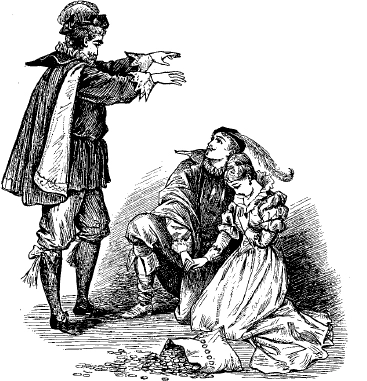However, when news arrives in Chapter XV of Mr. March’s illness at the front, the war truly hits home, and its intrusion at this point suggests that Alcott was beginning to think about the likely audience for her work. Despite her later frequent protestations that she wrote primarily for money, Alcott also wrote to serve as a source of strength and guidance for her young readers, and she took this obligation seriously. If, as Niles had intimated, Little Women might be a grand success, it would also be a fine opportunity for Alcott to offer words of wisdom and comfort on a subject that mattered greatly to her and to her audience. When Little Women Part First was published, the war had been over for less than three and a half years. Telegrams like the one sent to Mrs. March, often bearing even darker news, had virtually blanketed the country. The Alcotts themselves had received such a telegram concerning Louisa herself; in January 1863, while serving as an army nurse in Georgetown, Louisa had very nearly died from typhoid pneumonia. The war claimed hundreds of thousands of men. The number of Megs, Jos, Beths, and Amys they left behind may never be ascertained. Surely one of the best uses to which Alcott might put her fiction was to share her readers’ grief. To those with a Mr. March who would never come home, she might say something about how one carried on with grace and courage when one’s family was no longer whole. Even at the beginning of Little Women, Jo has an active sense of public duty; in Chapter I, she is already knitting socks for Union soldiers. In the second half of Part First, that sense intensifies. Jo’s sale of her hair to help in “making father comfortable, and bringing him home” is a sacrifice of a higher order, one that parallels Alcott’s loss of her own hair, which was shaved off while she struggled to survive the disease she contracted at the hospital. For those whose sacrifices in the war had made them, too, feel sadder, uglier, or less beloved, Jo’s donation of her hair was a potent gesture of solidarity.

As Alcott readied herself to write Part Second of Little Women, her consciousness of audience changed yet again, this time in the direction of mild resentment. She found that people wanted her to write in ways that did not strengthen their moral fiber, but seemed instead to cater to their taste for conventionality and female submissiveness. Alcott’s chief annoyance came in the form of fan letters—untold numbers of them—that expressed a common theme. Her young fans raved about Part First and could not wait for Part Second, in which, as many seemed to think inevitable, Jo would marry Laurie.
Alcott bristled at the very thought. Her identification with Jo was already deep and personal; her fans’ assumption that the only possible happy ending for a heroine was marriage not only offended Alcott’s firm belief in female equality but also seemed to imply that Alcott’s own happiness as an unmarried writer was less authentic and complete than if she had found a husband. At the same time that she basked in her readers’ adulation, she fulminated at their shallowness. “Girls write to ask who the little women will marry, as if that was the only end and aim of a woman’s life,” she groused. “I won’t marry Jo to Laurie to please anyone.” But Roberts Brothers insisted “on having people married off in a wholesale manner.” The demand that Jo must have a husband “much afflict[ed]” Alcott. Still, as she thought about the sales she might lose if she stuck to her principles, she found at last that she “didn’t dare to refuse.” As she often did when life grew too complicated to confront with a straight face, she sought a solution in humor. “Out of perversity” and much against her personal wishes, she concocted Professor Bhaer and thus contrived “a funny match” for Jo.2 Still, her compromise annoyed her. When a waggish friend suggested that the highly matrimonial Part Second of the novel should be christened “Wedding Marches,” Alcott seems to have been only half amused.
The argument over whether Jo should marry Laurie, or anyone at all, shows that the text of Little Women was an object of struggle and negotiation, involving Alcott’s individual will, her relations with her publisher, and her sense of obligation to her readership. Before she began to tackle Part Second, Alcott told a correspondent that she would very gladly write “this sort of story” and nothing else, but could not because the genre did not “pay as well as rubbish.” However, after the ensuing months and years proved to her that the genre might pay very well indeed, she came to have less regard for it, even tending to dismiss it as a species of rubbish all its own. By 1878, she had quite reversed her judgment. “I do not enjoy writing ‘moral tales’ for the young,” she confided, “I do it because it pays well.” Until the very end of her life, Alcott hoped to feel secure enough that she might write what she chose, not merely what an audience would buy.
1 comment